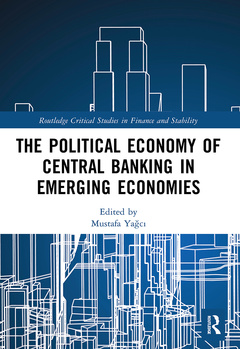The Political Economy of Central Banking in Emerging Economies Routledge Critical Studies in Finance and Stability Series
Coordonnateur : Yağcı Mustafa

Since the start of the Global Financial Crisis in 2008, research on central banking has gained momentum due to unusual levels of central bank activism and unconventional monetary policy measures in many countries. While these policies drew significant attention to advanced economy central banks, there has been much less academic focus on central banking in emerging economies. This book extends the research on the political economy of central banking by focusing on the emerging economies in Asia, Africa, Latin America, and the European periphery.
Central banks are at the heart of economic policymaking, and their decisions have a significant impact on the social and economic well-being of citizens. Adopting an interdisciplinary political economy perspective, the contributions in this book explore the reciprocal relations between politics, economics, and central banks, and how the global and domestic political economy contexts influence central bank practices. The chapters employ diverse theoretical perspectives such as institutional and organizational theory, developmental state resource dependency, and gender studies, drawing on disciplines ranging from politics, international relations, public policy, management, finance, and sociology.
This book will appeal to academics and students of central banking, political economy, and emerging economies, as well as professionals and policymakers engaged with central banks, monetary policy, and economic development.
(1) Introduction: Political Economy of Central Banking in Emerging Economies Part 1 – Global Influences on Central Banking in Emerging Economies: Debates on Central Bank Independence and Institutional Evolution in National Economies (2) Institutional Metamorphosis: The Backlash Against Independent Central Banking (3) Central Banks and Institutional Evolution in Transition (4) Building Confidence ‘On the Ground’: Encounters Between Finance and the Central Banks of South Africa and Turkey (5) The impact of political-technocratic consensus on institutional stability and change: Monetary and financial governance in Argentine and Chile Part 2 – Central Banking in the European Periphery (6) The impact of European economic governance and EU accession negotiations on the central banks in candidate countries: the case of the National Bank of Serbia Part 3 – Central Banking in Africa (7) The political economy of central banking in Nigeria: a resource dependence perspective (8) The Independence of the South African Reserve Bank: Coming full circle in 25 years? Part 4 – Central Banking in Latin America (9) Gender diversity as a tool to make central banks progressive institutions: the case of the Central Bank of Ecuador (10) The Political Economy of Brazil’s Enigmatic Central Bank, 1988-2018 Part 5 – Central Banking in Asia (11) Interpreting the Evolution of the Monetary Regime in Russia: The Political Economy of Rent Seeking and Central Banking (12) The PBOC in the “New Era” of Chinese Political Economy (13) Conclusion: New Venues of Research on Central Banking in Emerging Economies
Mustafa Yağcı is an Assistant Professor of International Political Economy at İstinye University, İstanbul, Turkey.
Date de parution : 04-2022
15.6x23.4 cm
Date de parution : 09-2020
15.6x23.4 cm
Thèmes de The Political Economy of Central Banking in Emerging... :
Mots-clés :
CBI; Central Banks; central banking; Monetary Policy; unconventional monetary policy; Inflation Targeting; emerging economies; Federal Reserve; Independent Central Banks; political economy; Central Banking Activities; politics; SA Reserve Bank; public policy; Central Bank Transparency; sociology; Central Bank Governor; institutional theory; Political Economy Context; gender studies; Central Bank Autonomy; developmental state studies; Vice Versa; CCP; BRI Country; Em Central Bank; FSU Country; Macroprudential Policy; Gdp Forecast; Unconventional Monetary Policy Measures; Late Apartheid South Africa; Nigerian Civil Service; Shadow Banking; Natural Resource Rent; Increased Gender Diversity



